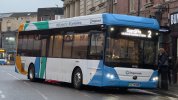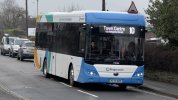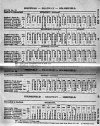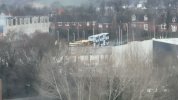Hold this thought

Upcoming changes? I did suggest something like this in the consultation last year, but was told as the 90 is tendered on that section they are unlikely to be able to change anything...
I think the 74/74a/77 is fine how it is; it works well.
I'm not familiar with the area so can't really comment. I was thinking if the 74/74a just did Middlecroft then it would be closer in timing to the 77, giving a more even 4x hourly between Staveley and Chesterfield. Although that would increase journey times for Inkersall Green due to the longer route the 90 takes.
Harsh take, but if this part of the route had custom, the 78 wouldn't have failed.
Nothing to do with the fact there were only three journeys a day each way?
I absolutely agree that the 42 is pointless; sending more buses down into Lowedges is like taking coals to Newcastle! I saw it suggested that the 42 be extended to Coal Aston instead of Lowedges as it only gets the hourly 44.
Possibly. Running fast via Green Lane rather than round the houses wouldn't be much slower than going via the bypass to Sheepbridge, although it would lose some of the attraction to Dunston residents of the faster link (than currently) to Sheffield. Personally, I'd run both it and the 44 via Dunston and tweak the 5 and 10 to give more even coverage but only half-hourly. I'd probably also divert the 90 via Highfield Road, rather than the 5 going that way. We don't need that many buses past the depot!
On a couple of duties, the 42 has you sit at Lowedges for 20+ minutes between trips. Where's the sense in that?
Built in break I guess, but are there any facilities there? Surely in that time you could run to Dronfield Civic Centre if nothing else.
How desperate are operators to electrify their networks? How bad would it be in the future to just leave a route operating with diesel buses? One Euro6 bus if used properly can take dozens of cars off the road. I'd say that's a good enough environmental trade-off. Whilst I am a huge fan of electric buses, I think the government should be funding other things like bus infrastructure and lower fares among other things to promote bus usage over cars. That's not to say EVs shouldn't be funded.
Electric buses should have lower operating costs, although as was mentioned on the Zebra2 thread if operators still have to cover 25% of the CapEx cost then the sums become more complicated. Whether operating costs dominate in terms of bus fares is something I'm not qualified to answer, but from other discussions I remember, I suspect not.
I think it was discussed on here a while back that most operators are looking to take £100/hr for a route to be viable. Just as a sample, the 44 takes 1h10 for a single journey of about 14 miles. If we say 12 miles and hour and estimate on the low end of fuel consumption, that's 7l of fuel needed, or around £10. I know the operator gets a rebate of duty for that fuel, I'm not sure how much. Either way, you are looking at under 10% of the per-hour revenue a route needs to make in fuel terms, going electric is at best going to reduce that by a couple of percent.
You then also get issues around the cost of electricity. I'd imagine most charging can be done overnight when they can get a better rate to stabilise the base load of the grid, but still things can vary a lot, while diesel isn't likely to suddenly spike.
EVs for urban routes I've got no trouble with - that's where you get the most positives. Rural routes? Nice if you can justify it, but the benefits are lower.
The build quality of the newly delivered Yutongs is absolutely phenomenal.
I must try and get out and sample them soon. As someone in engineering I'm torn - it's great we are getting well built buses, but it depresses me that this country and indeed Europe as a whole have dropped the ball and got so far behind in terms of design and build. We also seem to forget that even a more expensive bus that feeds in to the UK workforce and supply chain can be a lower cost investment for the country as a whole.





